-
13 June 1483-Execution of William Hastings, 1st Baron Hastings.He was an English nobleman. A follower of the House of York, he became a close friend and one of the most important courtiers of King Edward IV, whom he served as Lord Chamberlain. He was executed on charges of treason by Edward's brother and ultimate successor, Richard III.
1525 - Martin Luther marries Katharina von Bora, against the celibacy rule decreed by the Roman Catholic Church for priests and nuns.

1535 - Death of George Neville, 3rd Baron Bergavenny.He was an English courtier. He held the office of Lord Warden of the Cinque Ports.

1536-Princess Mary to Cromwell
"Good Mr. Secretary, I do thank you with all my heart for the great pain and suit you have had for me." I see by your letters that you mislike my exception in my letter to the King. I assure you I did not mean it as you take it, "for I do not mistrust that the King's goodness will move me to do anything which should offend God and my conscience. But that which I did write was only by the reason of continual custom; for I have always used both in writing and speaking to except God in all things. Nevertheless, because you have exhorted me to write to his Grace again, and I cannot devise what I should write more but your own last copy without adding or minishing, therefore I do send you by this bearer, my servant, the same, word for word; and it is unsealed, because I cannot endure to write another copy. For the pain in my head and teeth hath troubled me so sore these two or three days, and doth yet so continue, that I have very small rest, day or night." I trust in your goodness that the King may accept this; for I have no one to make suit to or ask counsel of but you. Hownsdon, 13 June.

source:http://www.british-history.ac.uk/
-
12 June 1442 - King Alfonso V of Aragon occupies Naples
1492 – Burial of Elizabeth Woodville

1530 – Catherine of Aragon told Henry VIII to abandon his “wicked” life.

1535 – Richard Rich visits Thomas More's cell and takes away his books and writing materials. Rich later will testify that during the course of his visit, More, in responding to a hypothetical question, suggested that Parliament had no more power to enact the Act of Supremacy than it did to pass a law declaring God not to be God. Thomas More's statement, if actually made, would violate the Treason Act because it denied the king's title as the supreme head of the Church. (Thomas More later denies ever making any such statement to Rich.) Two days later,Thomas More is questioned by official investigators--a sort of preliminary hearing for his trial.

1537-Henry VIII. to the Duke of Norfolk.
We have received your letters of the 2nd inst., with those addressed to the lord Privy Seal, showing your loyal heart upon the news of the quickening of our wife the Queen, which you may be assured we shall have in good remembrance. We have in consultation with our Council in reference to your request what numbers of men should repair to attend us in the North, determined to put off our journey thither till another year. Reasons for this: 1. That the Emperor has sent hither to us a noble man with overtures for the weal of all Christendom, stating that he means to send two other personages of great honour. 2. That the Queen being now quick with child, she might be in danger from rumours blown abroad in our absence, and it is thought we should not go further than 60 miles from her. 3. That as the Emperor and the French king are now both in arms and have each great numbers of men near the marches of Calais, we should be near at hand to prevent a breach of neutrality. 4. We have not visited the North since the beginning of our reign and the year is so far spent and the country so wasted that we could hardly get beyond York, whereas next year we might visit Hull, Carlisle, Newcastle, Durham, and Berwick. For these reasons, and those which you signified to us by Maunsell when you desired to know our decision about our journey, both for a pardon to be otherwise granted to put the people out of fear and for the stay of their preparations, we have determined to send down a personage of honour with our said pardon, and we desire you to proclaim this in York and in all such towns as you can easily visit, by your own mouth. As to your suit to return, although we can hardly be so well served there we purpose shortly to revoke you and establish a standing council there to keep those countries in quiet and administer justice. Let us know by your next letters your advice on this subject, what persons ye think meet for the said council and how you find the country disposed. Finally, on the arrival here of Thomas Strangways we find he has been a most arrant traitor and continues in his treasons, labouring to excuse wholly lord Darcy and Constable, and speaking as if our subjects there much repined at their punishments, saying also they are more meet to rule than you and better beloved. It would be well, therefore, to have them executed about Doncaster, and that we should send the said Darcy, Constable and Aske down for that purpose. If you think this good, make arrangements accordingly.
Thus we have declared to you the causes that have specially moved us to put off our intended journey, which you are to set forth as above expressed. But to be frank with you, which you must keep to yourself, a humour has fallen into our legs, and our physicians advise us not to go so far in the heat of the year, even for this reason only.

1540 – Thomas Cromwell wrote to King Henry VIII from the Tower of London, asking for mercy and pleading his innocence.
Prostrate at your Majesty's feet, I have heard your pleasure by your Controller, viz., that I should write such things as I thought meet concerning my most miserable state. And where I have been accused of treason, I never in all my life thought to displease your Majesty; much less to do or say “that thing which of itself is so high and abominable offence.” Your Grace knows my accusers, God forgive them. If it were in my power to make you live for ever, God knows I would; or to make you so rich that you should enrich all men, or so powerful that all the world should obey you. For your Majesty has been most bountiful to me, and more like a father than a master. I ask you mercy where I have offended. Never spoke with the Chancellor of the Augmentations and Frogmerton together at a time; but if I did, I never spoke of any such matter. Your Grace knows what manner of man Throgmerton has ever been towards you and your proceedings. What Master Chancellor has been to me, God and he know best; what I have been to him your Majesty knows. If I had obeyed your often most gracious counsels it would not have been with me as now it is. But I have committed my soul to God, my body and goods to your pleasure. As for the Commonwealth, I have done my best, and no one can justly accuse me of having done wrong wilfully. If I heard of any combinations or offenders against the laws, I have for the most part (though not as I should have done) revealed and caused them to be punished. But I have meddled in so many matters, I cannot answer all.
The Controller showed me that you complained that within these 14 days I had revealed a matter of great secrecy. I remember the matter, but I never revealed it. After your Grace had spoken to me in your chamber of the things you misliked in the Queen, I told you she often desired to speak with me, but I durst not, and you thought I might do much good by going to her and telling her my mind. Lacking opportunity I spoke with her lord Chamberlain, for which I ask your mercy, to induce her to behave pleasantly towards you. I repeated the suggestion, when the lord Chamberlain and others of her council came to me at Westminster for licence for the departure of the strange maidens. This was before your Grace committed the secret matter to me, which I never disclosed to any but my lord Admiral,by your commandment on Sunday last; whom I found equally willing to seek a remedy for your comfort, saying he would spend the best blood in his belly for that object.
Was also accused at his examination of retaining contrary to the laws. Denies that he ever retained any except his household servants, but it was against his will. Was so besought by persons who said they were his friends that he received their children and friends—not as retainers, for their fathers and parents did find them; but if he have offended, desires pardon. Acknowledges himself a miserable sinner towards God and the King, but never wilfully. Desires prosperity for the King and Prince. “Written with the quaking hand and most sorrowful heart of your most sorrowful subject, and most humble servant and prisoner, this Saturday at your Tower of London.”

1553 - King Edward draws up the paperwork to name Lady Jane Grey as his successor.
1553 - King Edward VI accept archbishop Cranmer's "42 Articles"
1567 – Death of Richard Rich, 1st Baron Rich.He was Lord Chancellor during the reign of King Edward VI of England from 1547 until January 1552.

source:http://www.onthisdayintudorhistory.com/,http://law2.umkc.edu/
-
11 June 1429-Joan of Arc Leads French Forces to Victory at Battle of Jargeau
1456 - Birth of Anne Neville at Warwick Castle.She was an English queen, the daughter of Richard Neville, 16th Earl of Warwick (the "Kingmaker"). She became Princess of Wales as the wife of Edward of Westminster and then Queen of England as the wife of King Richard III.
As a member of the powerful House of Neville, she was caught up in the Wars of the Roses fought between the House of York and House of Lancaster for the English crown. Her father Warwick betrothed her as a girl to Edward, Prince of Wales, the son of Henry VI.The marriage was to seal an alliance to the House of Lancaster and continue the civil war between the two houses of Lancaster and York.
After the death of Edward, the Dowager Princess of Wales married Richard, Duke of Gloucester, brother of Edward IV and of George, Duke of Clarence, the husband of Anne Neville's older sister Isabel. Anne Neville became queen when Richard III ascended the throne in June 1483, following the declaration that Edward IV's children by Elizabeth Woodville were illegitimate. Anne Neville predeceased her husband by five months, dying in March 1485. Her only child was Edward of Middleham, who predeceased her.
1488 - Death of James III of Scotland.He was King of Scots from 1460 to 1488. James was an unpopular and ineffective monarch owing to an unwillingness to administer justice fairly, a policy of pursuing alliance with the Kingdom of England, and a disastrous relationship with nearly all his extended family. However, it was through his marriage to Margaret of Denmark that the Orkney and Shetland islands became Scottish.
His reputation as the first Renaissance monarch in Scotland has sometimes been exaggerated, based on attacks on him in later chronicles for being more interested in such unmanly pursuits as music than hunting, riding and leading his kingdom into war. In fact, the artistic legacy of his reign is slight, especially when compared to that of his successors, James IV and James V. Such evidence as there is consists of portrait coins produced during his reign that display the king in three-quarter profile wearing an imperial crown, the Trinity Altarpiece by Hugo van der Goes, which was probably not commissioned by the king, and an unusual hexagonal chapel at Restalrig near Edinburgh, perhaps inspired by the Church of the Holy Sepulchre in Jerusalem.
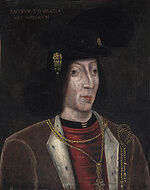
1509 - Henry VIII married Catherine of Aragon at Greenwich Palace.

1513-Licence by the King (who intends speedily to pass over sea against the French King and desires that his wife Katharine queen of England may be suitably attended) for servants of the Queen to be exempted from attendance upon him in the said wars. "Her Chamberlain and Chancellor hath certified" the names of her said councillors, officers and servants as appears "in a [schedule] to these our letters patents annexed. Given at our manor of Grenewyche, &c." Mem. subscribed: In the warrant of the Privy Seal for the above be it specified that any persons named in the said schedule shall, upon request and, without fine, have letters patent to the above effect bearing the date of this "grant."
1520-Martin Luther Publishes Book Attacking the Papacy

1528-Anne Boleyn to Wolsey
My Lord, in my most humble wise I desire you to pardon me that I am so bold to trouble you with my simple and rude writing, proceeding from one who is much desirous to know that your Grace does well, as I perceive by this bearer. The great pains you take for me, both day and night, are never likely to be recompensed, "but alonely in loving you, next unto the King's grace, above all creatures living," as my deeds shall manifest. I long to hear from you news of the Legate, and hope they will be very good.
Added by the King:—The writer of this would not cease till she had called me likewise to set to my hand. Both of us desire to see you, and are glad to hear you have escaped the plague so well, trusting the fury of it is abated, especially with those that keep good diet, as I trust you do. The not hearing of the Legate's arrival in France causeth us somewhat to muse; but we trust by your diligence shortly to be eased of that trouble.

1536- Dr. Ortiz to the Empress.
On the first day of Whitsuntide the convocation of the Council at Mantua was promulgated.
Chapuys writes that "La Ana" and her five lovers, one of them being her brother, were imprisoned in the Tower on May 2. They were beheaded on May 17, and she on the following Friday. The King has ordered Parliament to be summoned after Whitsuntide. It is hoped that many good things will be done. The Princess has been suffering in her head and molar teeth, but it is not of much consequence.
La Ana was beheaded before many people. She took the Sacrament in prison before her execution, and complained that she had not been executed on Wednesday with her brother, saying that she hoped to have gone to Paradise with him, and that she died by the laws of the kingdom. Two of the five confessed their guilt. One, who was the principal gentleman of the King's chamber, said a great deal about the justice of his death, and that a favoured servant ought not to flatter his prince and consent to his desires as he had done. Rome, 11 June 1536.
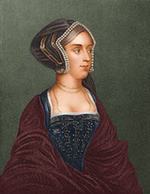
1546-Peace with France.
Proclamation of the peace concluded with the French king, in which is also included the Emperor Charles.
1560 - Death of Mary of Guise.She was queen of Scotland as the second spouse of King James V. She was the mother of Mary, Queen of Scots, and served as regent of Scotland in her daughter's name from 1554 to 1560. A native of Lorraine, she was a member of the powerful House of Guise, which played a prominent role in 16th-century French politics. Her main goal was a close alliance between the powerful French Catholic nation and small Scotland, which she wanted to be Catholic and independent of England. She failed and at her death the Protestants took control of Scotland.

1594 – Philip II recognizes the rights and privileges of the local nobles and chieftains in the Philippines, which paved way to the stabilization of the rule of the Principalía (an elite ruling class of native nobility in Spanish Philippines).

source:http://www.british-history.ac.uk/,wikipedia
-
10 June 1523 – Copenhagen is surrounded by the army of Frederick I of Denmark, as the city won't recognise him as the successor of Christian II of Denmark.
1536-Anne Boleyn's Execution.
Anonymous letter giving an account of the execution on Wednesday 17th May of lord Rochford, Weston, Brereton, Norris, and Smeton, and on Friday the 19th of Anne Boleyn; with a report of their speeches on the scaffold. After her execution the Council declared that the Queen's daughter was the child of her brother, and that she should be removed from her place and the daughter of the former again acknowledged as princess and successor in the kingdom; "and the King did so receive her with the utmost graciousness." London, 10 June 1536.

A copy of this tract, probably unique, belonging to the earl of Crawford and Balcarres, was exhibited at Aberdeen in the Loan Collection of MSS. at the time of the meeting of the British Association in 1885, and was collated with the letter in the Excerpta Historica for the Editor of this work by Mr. J. P. Edmond.
Princess Mary to Cromwell.
I send by the bearer, my servant, "both the King's Highness' letter, (Meaning her letter to the King's Highness) sealed, and the copy of the same, again to you." You will see I have followed your advice, and will do so in all things concerning my duty to the King, God and my conscience not offended; for I take you as one of my chief friends next his Grace and the Queen. I desire you, for Christ's passion, to find means that I be not moved to any further entry in this matter than I have done; for I assure you I have done the utmost my conscience will suffer me, and I neither desire nor intend to do less than I have done. "But if I be put to any more (I am plain with you as with my great friend) my said conscience will in no ways suffer me to consent thereunto." Except in this point, neither you nor any other shall be more desirous to have me obey the King than I shall be ready to do so. I had rather lose my life than displease him. I beg you to take this letter in good part. I would not have troubled you so much, but that the end of your letter caused me a little to fear I shall have more business hereafter. Hownsdon, 10 June.

Princess Mary to Henry VIII.
Begs his daily blessing. Has already, she trusts, obtained forgiveness on her suit, with licence to write to him; but hopes for some token or message of reconciliation, and that she may obtain her fervent desire of access to his presence. Excuses her importunity. Begs him to accept his penitent child, who henceforth puts her state and living in his mercy, next to Almighty God, under whatever conditions. Prays God preserve him and the Queen, and send them a prince. Hownsdon, 10 June.

Cromwell to Princess Mary.
"I have received your letters, whereby it appeareth you be in great discomfort, and do desire that I should find the means to speak with you." Your discomfort can be no greater than mine, who upon your letters have spoken so much of your repentance for your wilful obstinacy against the King, and of your humble submission to obey his pleasure and laws in all things without exception or qualification. Knowing how diversely and contrarily you have proceeded at the late being of his Majesty's Council with you, I am ashamed of what I have said and afraid of what I have done. What the sequel shall be God knows. With your folly you undo yourself, and I say to you, as I have said elsewhere heretofore, it were pity you should not be an example in punishment, "if you will make yourself an example in the contempt of God, your natural father and his laws by your only fantasie, contrary to the judgments and determinations of all men that ye must confess do know and love God as well as you." To be plain with you, I think you the most obstinate woman that ever was, and I dare not open my lips to name you unless I have such a ground thereto that it may appear you were mistaken, or at least that you repent your ingratitude and are ready to do your duty. I have therefore sent you a book of articles to subscribe, on receiving which from you again, with a letter declaring that you think in your heart as you have subscribed with your hand, I will venture to speak for your reconciliation. If you do not leave all sinister counsels, which have brought you to the point of undoing, I take leave of you for ever, and desire you to write to me no more; "for I will never think you other than the most ungrate, unnatural, and most obstinate person living, both to God and your most dear and benign father. And I advise you to nothing, but I beseech God never to help me if I know it not so certainly to be your bounden duty, by God's laws and man's laws, that I must needs judge that person that shall refuse it not meet to live in a Christian congregation; to the witness whereof I take Christ, whose mercy I refuse if I write anything unto you that I have not professed in my heart and know to be true."
1538 - Catholic German monarchy signs League of Neuremberg
1540 - Thomas Cromwell was arrested for high treason at a Council meeting and imprisoned in the Tower.A bill of attainder(an act of a legislature declaring a person or group of persons guilty of some crime and punishing them without privilege of a judicial trial) containing a long list of indictments, including supporting Anabaptists, protecting Prostestants accused of Heresy and thus failing to enforce the Act of Six Articles, and plotting to marry Lady Mary Tudor, was introduced into the House of Lords a week later, and was passed on 29 June 1540. He was also connected with 'sacramentarians'(those who denied transubstantiation) in Calais. All Cromwell's honours were forfeited. The King deferred the execution until his marriage to Anne of Cleves could be annulled. Hoping for clemency, Cromwell wrote in support of the annulment in his last personal address to the King
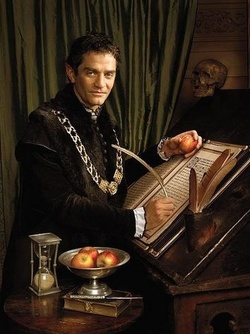
Cranmer to Henry VIII.
Heard yesterday in the King's Council that Cromwell is a traitor. Expresses his amazement and grief that he should be a traitor who was so advanced by the King and cared for no man's displeasure to serve him, and was so vigilant to detect treason that King John, Henry II., and Richard II., had they had such a councillor, would never have been so overthrown as they were. Loved him as a friend, and the more for the love he seemed to bear the King; and now, although glad that his treason is discovered, is very sorrowful; for whom shall the King trust hereafter? Prays God to send the King a councillor he can trust, and who, for all his qualities, can serve like him.

1543-Mary Queen Of Scots to Christian III.
In former letters signified the death of her father and appointment of James earl of Arran to the tutelage of herself and the realm; and also how her father, when he died, in his last will, commanded (after the ancient custom) that she and the princes of Scotland should cultivate the ancient confederacy with the kings of the Danes. Edw. Crawfurde, Hen. Tindel and David Carnebe, her subjects, who are about to sail into Prussia for grain, have petitioned her to beg him to commend them by letter to the prince of Prussia, his sister's husband. Begs him to permit them and other Scots to trade for grain within his realms and (at his request) those of his confederates. Linlithgow, 10 June 1543.

1584 - Death of Francis, Duke of Anjou and Alençon.He was the youngest son of Henry II of France and Catherine de' Medici.
In 1579, arrangements began to be made for marrying him to Elizabeth I of England. Alençon, now Duke of Anjou, was in fact the only one of Elizabeth's foreign suitors to court her in person. He was 24 and Elizabeth was 46. Despite the age gap, the two soon became very close, Elizabeth dubbing him her "frog" on account of a frog-shaped earring he had given her
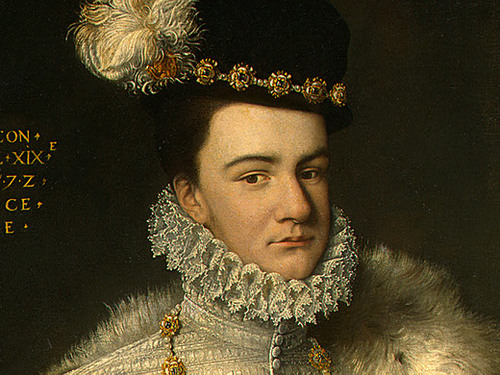
source:http://www.british-history.ac.uk/,wikipedia

Damian Lewis appears in Tudor costume to play King Henry VIII in BBC drama Wolf Hall
http://www.dailymail.co.uk/tvshowbiz/article-2653199/Damien-Lewis-appears-Tudor-custom-play-King-Henry-VIII-new-BBC-drama-Wolf-Hall.html
-
9 June 1511 - Death of William Courtenay, 1st Earl of Devon,feudal baron of Okehampton and feudal baron of Plympton,was a member of the leading noble family of Devon. His principal seat was Tiverton Castle, Devon with further residences at Okehampton Castle and Colcombe Castle, also in that county.

1533- Sir Edw. Baynton to Lord Rochford.
The Queen's coronation is honorably passed "as ever was, if all old and ancient men say true." Mr. Will. à Brereton has been here since your departure about the matter your Lordship put me in trust in. "The news that came last night with your Lordship's letter be marvellously mused on," but they are too high for me. "And as for pastime in the Queen's chamber was never more. If any of you that be now departed have any ladies that they thought favored you, and somewhat would mourn at parting of their servants, I can no whit perceive the same by their dancing and pastime they do use here." There is a hawk called a merlyon, that I think is not yet ready to fly at the larks in this country. Begs him to thank my lord of Norfolk for his token. Tell him my lord of Suffolk is loth to let fall a noble unless he took up a royal for it. "The matter doth partly appear in a letter by my Lady your wife's, or else by some others, I am sure, that hath advertised him by their letters." Will not write at present "the circumstances of the way." Greenwich, 9 June.

1549-The Book of Common Prayer is first used in English churches on this Pentecost. Created by a group of English scholars, but primarily Archbishop of Canterbury Thomas Cranmer, it becomes the principal liturgical text of the Anglican church.
The full title at this time is "The Book of the Common Prayer and Administration of the Sacraments and other Rites and Ceremonies of the Church after the Use of the Church of England."
Creation of this book has been a decisive move in the direction of Protestantism because it places the primary emphasis of worship on the Bible itself while removing a number of Catholic ceremonial elements. It also gives the services in English rather than Latin, thus appealing directly to the people.
At the same time, the contents are general enough that they can be open to both Catholic and Protestant interpretations. This makes it easier to get the people to use it without objection because it appeals to their expectations and what they are used to while gradually moving them away from Catholic traditions.
source:http://skepticism.org/
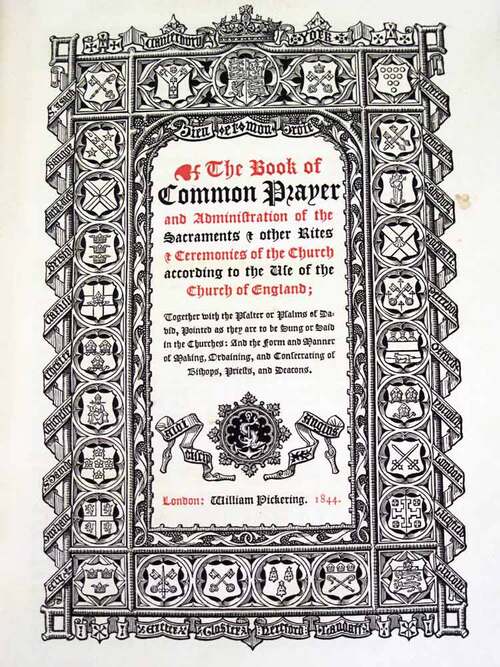
1563 – Death of William Paget, 1st Baron Paget, English accountant and politician

1572 – Death of Jeanne d'Albret, French wife of Antoine of Navarre

1583 – Death of Thomas Radclyffe, 3rd Earl of Sussex, English politician, Lord Lieutenant of Ireland






